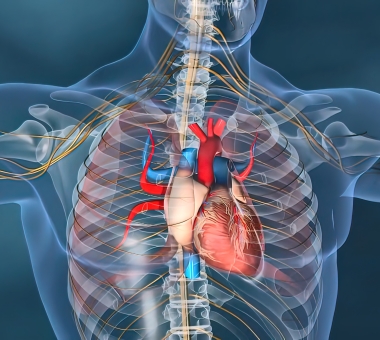
Women's Cardiovascular Health
Did you know that coronary artery disease (CAD), also known as “heart disease,” is the leading cause of death for women* (assigned female at birth) in the U.S., killing 314,186 women in 2020—or about 1 in every 5 female deaths?1 If so, you’re a step ahead of many others. Now more than ever, with obesity and diabetes rising in the U.S., it's time to take notice. Make sure you know the warning signs of a heart attack and stroke; control the risks you can; get the tests and treatment you need; and, if you want, participate in clinical trials about female health or that specifically include female participants.
What's the difference...?

One way to fight the prevalence of heart disease is to know the female-specific symptoms of various heart issues, including heart attack and stroke.

Female bodies have special risk considerations when it comes to developing heart disease, including hormonal changes such as menopause.
The patient experience

Several tests can help you determine your risk of heart disease, including blood tests, stress tests, an echocardiogram, and an electrocardiogram.

You can bring a list of prepared questions to your next doctor's appointment to help you talk to your doctor about topics related to your cardiovascular health.

Treatment outlook
When appropriately applied, females benefit from the same types of treatment for heart disease as males, including lifestyle changes, medications, and interventional procedures.
The gender gap in heart disease
Unfortunately, women* haven’t reached equality with men* regarding complications and outcomes from heart disease treatment. Though research findings from studies conflict somewhat, the overall consensus has been that females are more likely than males to die within the first year after a heart attack. After that time, the risk of mortality equalizes.
Proposed reasons for more deaths in females with heart attacks compared with males have spanned a range of possibilities from bias to biology. Females may have been diagnosed later, treated less aggressively with surgery and interventional procedures, and less often been prescribed medication and referred to cardiac rehabilitation programs. This might be because heart attack was falsely considered a condition unique to males.
Some individuals delay seeking treatment, thinking that they can’t possibly be having a heart attack. The myth that females are unlikely to have heart attacks has been fed by the fact that female heart attack symptoms are often less defined than male symptoms. These symptoms are common to many conditions, which can easily pose a diagnostic challenge to doctors.
What about biology?
Do females have poorer outcomes from heart disease treatment because of biological differences between males and females? More research is necessary to answer this question definitively, but it seems likely that biology does play a role. After menopause, individuals are more likely to have heart attacks. So, the “typical” female heart attack patient may be 10 to 15 years older than a male one. And because female heart attack patients are often older, they may have more coexisting health problems.
Beyond heart attack deaths, females lag in other key areas related to heart disease treatment:
- Surgical and interventional complications caused by bleeding
- Referral to and enrollment in cardiac rehabilitation programs, with the lowest rates for low-income and African-American females
- Treatment of stable angina (chest pain)
A note about transgender individuals and cardiovascular health
Currently, transgender individuals represent approximately 0.6–1.1% of the general population.2 And while the percentage of individuals whose gender identity, gender expression, and behavior differ from their assigned sex at birth continues to increase, health outcomes in transgender individuals have been understudied.
Studies3 have shown that there’s a direct link between hormones and cardiovascular risk, and this risk increases in transgender individuals who undergo gender-affirming hormone therapy (GAHT) and/or gender-affirming surgery involving the removal of hormone-driven reproductive organs. However, there’s currently a limited number of cardiovascular studies focused on this specific population, largely because these studies are difficult to interpret due to a variety of hormone regimens and observation periods, as well as the introduction of GAHT at increasingly earlier ages—even before the full development of the secondary sexual characteristics. There’s an overwhelming need within the medical community to understand the cardiovascular risks in transgender individuals, given that cardiovascular disease is a leading disease-specific cause of death among this population.4
Closing the gap
While research studies have differed in their findings, serious attempts are being made to give female heart attack patients the same hopes for survival and quality of life as their male counterparts. For example, a study published in the American Journal of Medicine in 2008 detailed the results of implementing new cardiology guidelines from the European Society of Cardiology and the American College of Cardiology in hospitals in Israel. The result was a reduction in the number of deaths in females within one year after they were admitted to a hospital for acute coronary syndrome (a blockage in the blood supply to the heart muscle). This reduction in deaths brought their odds of survival in line with male patients.
Additionally, a greater effort is being made in the medical community to gather research related to females and heart disease. According to a consensus statement from Women in Innovations (WIN), a consortium of female interventional cardiologists worldwide, females have been underrepresented in clinical trials and other studies, making it difficult for healthcare providers to determine the most successful treatments for them. Thankfully, that’s changing, as doctors, researchers, and others are working together to learn more about females and heart disease. A greater awareness of the differences between males and females and the impact of factors unique to females will lead to more effective treatments and better outcomes for everyone.
*The term “women” in the context of “women’s cardiovascular health” applies to individuals assigned female at birth (AFAB) who have a female biological reproductive system, which includes a vagina, uterus, ovaries, Fallopian tubes, accessory glands, and external genital organs.
*The term “men” in the context of “cardiovascular health” applies to individuals assigned male at birth (AMAB) who have a male biological reproductive system, which includes a penis, scrotum, testes, epididymis, vas deferens, prostate, and seminal vesicles.
Melissa Didn’t Think a Heart Attack Could Happen to Her
A heart attack was about the last thing on Melissa’s mind. The active mother of two sons had just seen her doctor for a complete physical a few months earlier and had no symptoms that would indicate heart disease.


